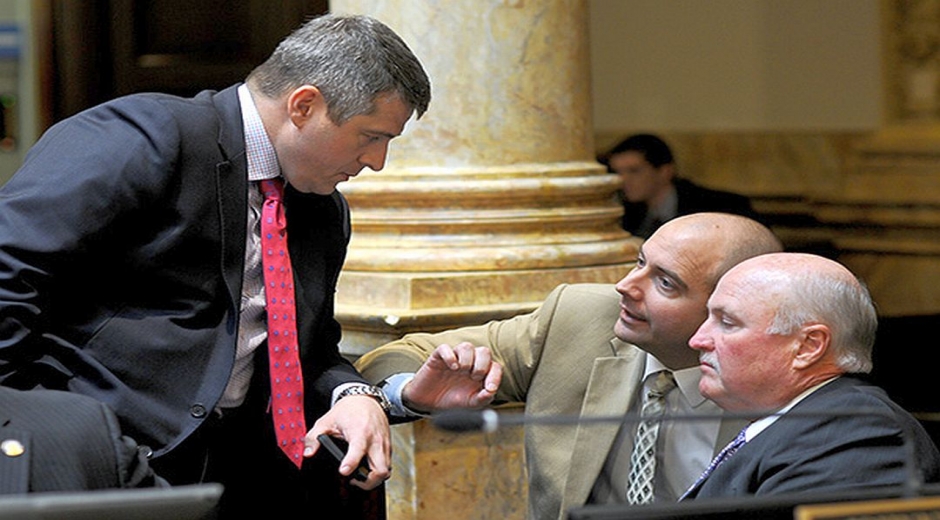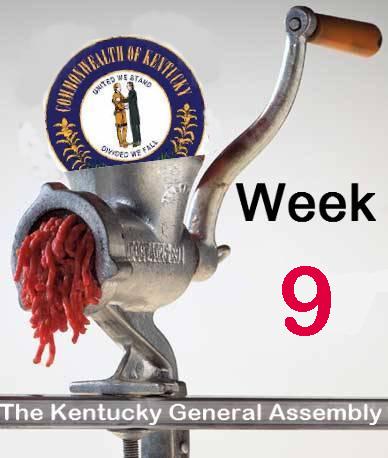
Week Nine Of The General Assembly

Thomas McAdam
iLocalNews Louisville is your best source of news and information about Derby City.
- Professional Journalist
A flurry of new bills were introduced last week, as filing deadlines for the Kentucky Senate and House came and went.
Eighty-eight bills were filed before the deadline in the House last Tuesday, followed by 37 in the Senate before the chamber’s Thursday deadline. That brings the total bills introduced in this year’s General Assembly session to 937. That total is the largest since 2008.
Topics for the deadline filings ranged from tax credits to promote investment in rural Kentucky counties and charter school pilot programs to medical marijuana programs. Even fees for horse jockeys.
As new bills were being filed last week, other bills continued working their way through the process. Bills that advanced in recent days include measures on:
Ultrasounds. The state Senate passed a bill requiring an ultrasound be performed before an abortion is performed. Under Senate Bill 152, the physician would also be required to provide a simultaneous explanation of the image to the patient. The patient would have the option to view the image but would not be required to do so. The bill also sets penalties for doctors failing to comply: $100,000 for a first offense and $250,000 for each subsequent violation, as well as being reported to the Kentucky Board of Medical Licensure. SB152 was passed Monday and advanced to the House for consideration.
Emergency personnel fitness. House Bill 384, passed by the House on Monday, would allow local governments to create and adopt voluntary health and fitness programs for their emergency personnel staffers. The bill does not include any mandate or appropriation for the programs, but allows local governments to accept private or public monies to set up such programs. HB384 is now in the hands of the Senate.
Kentucky Horse Park. Also on Monday, the Senate voted to reduce the size of the horse park’s governing board. Senate Bill 200 would trim the park commission from 17 members to nine. The bill is now in the House’s hands.
Nuclear power plants. Senate Bill 89 would change several requirements that have effectively prevented construction of nuclear power plants in Kentucky. The bill would change the requirement that facilities have means of permanent disposal of nuclear waste. Instead, they would only be required to have a plan for its safe storage, and that the plans be approved by the Nuclear Regulatory Commission. The bill passed a Senate vote on Tuesday and was forwarded to the House.
Protect emergency, health officials. On Tuesday, the House passed a bill that would increase the amount of time someone convicted of the attempted murder of a police officer or firefighter would be required to serve before being eligible for parole. Under House Bill 137, at least of 85 percent of a prison term would have to be served. House Bill 210, which adds health department inspectors and other staff to a class of protected professions, also passed a floor vote. HB210 would upgrade an attack on a health department employee to a third-degree assault. Both bills are now being considered in the Senate.
Victim rights. Senate Bill 175 would put a constitutional amendment on the November ballot to create a crime victim bill of rights. Victims of violent crimes would have the right to be notified of court hearings, the punishment and the release date for the perpetrator, as well as be involved throughout the justice process. Passed by the Senate on Tuesday, the measure is now under consideration by the House.
Conceal carry. The House Judiciary Committee passed House Bill 314, which would allow off-duty and retired law enforcement officers to carry concealed weapons in all locations on-duty officers can. HB 314 now faces a vote before the entire House.
Sexting. The Senate passed a bill on Thursday that would spare juveniles from a felony record if caught “sexting” – transmitting nude videos or photos of themselves or other minors via mobile phone. Senate Bill 37 would reduce the penalty from a felony to a Class-B misdemeanor for the first offense for perpetrators under the age of 18. Subsequent offenses would be Class-A misdemeanors. SB37 now goes to the House for consideration.
Executive branch ethics. House Bill 608, passed Thursday by the House State Government committee, is an update the Kentucky Executive Branch code of ethics. The bill includes language that would require state employees and Executive Branch officials to report suspected ethics code violations to the Executive Branch Ethics Commission. The bill would also allow the Commission to use its restricted funds, something that currently isn’t allowed unless authorized in the state budget. The bill would also give the Commission authority to change the registration fee charged to executive branch lobbyists. The fee is currently $125. House Bill 608 is now up for a full House vote.
Photo: Sen. Chris Girdler, R-Somerset (center), discusses legislation with Senate Democratic Floor Leader Ray Jones, D-Pikeville (left), and Sen. Johnny Ray Turner, D-Prestonsburg, on the floor of the Kentucky Senate. (LRC Public Information Photo)
(Robert Weber, of the Kentucky Legislative Research Commission contributed to this article)

Gideon John Tucker (February 10, 1826 – July 1899) was an American lawyer, newspaper editor and politician. In 1866, as Surrogate of New York, he wrote in a decision of a will case (Final Accounting in the Estate of A.B., 1 Tucker 248, N.Y. Surr. 1866): "No man's life, liberty or property are safe while the Legislature is in session."